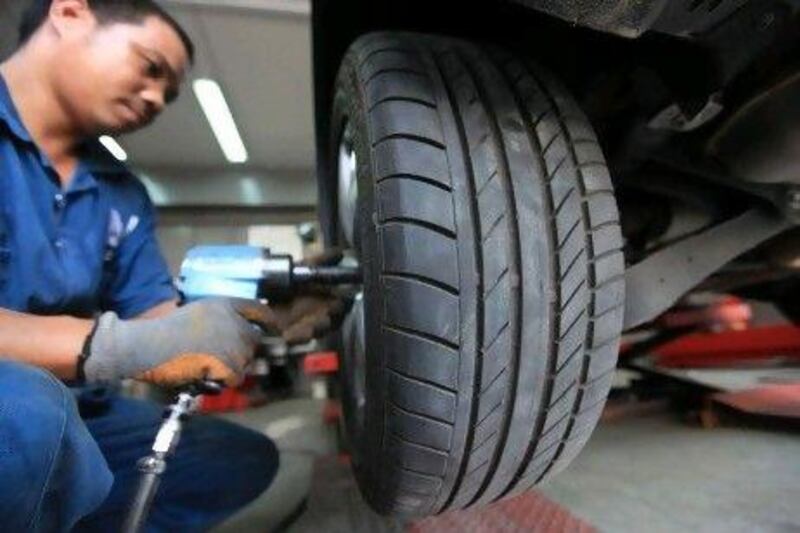ABU DHABI // Mohammed Tigani saved Dh2,500 by buying a set of second-hand tyres. But it almost cost him his life.
Mr Tigani, 25, crashed his car outside of Hatta a few weeks later when a front tyre exploded. He was driving between 140kph and 160kph.
"It just started falling apart," said the Sudanese translator. "I trusted the shop so I didn't even check them. Most shops sell second-hand tyres. "People are generally aware of the dangers but I don't know how much attention they give it."
Blown tyres have been the cause of 53 crashes in Abu Dhabi emirate this year, Abu Dhabi Police statistics released yesterday show.
As a result, six people died, six were severely injured, 24 were moderately injured and 17 had minor injuries. Last year there were 17 deaths attributed to burst tyres.
Drivers are at a higher risk in summer when heat expands the air inside the tyres.
Police have warned drivers to check their air pressure, tread, production date and not to overload vehicles.
"Check before you leave," said First Lt Mohammed Jassim of the police crash investigation department.
"Take care and buy a high-quality tyre. You pay to protect yourself against anything that happens."
Speeding, which causes more friction and heat, can be as dangerous as high temperatures, police said.
"People look for a low price," said First Lt Jassim. "They don't look for a good-quality tyre and that's a large reason for the crashes. Cheap tyres are not able to last in bad weather."
Illegally imported tyres can be unsafe even if they are recognised brands as they are often made for different climates, tyre dealers said.
"Too many tyres are imported illegally. They're at every shop in the market," said Sayed Morad, a biochemist and salesman at Bridgestone's Al Masood branch.
"They sell for half the price but they are not made for hot weather. They are made for the US and Europe."
Drivers can check tyres for codes identifying the recommended maximum speed, load-bearing ability, maximum inflation and temperature grade.
This is tyre-specific and usually found on the inner sidewall.
In June last year the Emirates Standardisation and Metrology Authority proposed a regulation system where each tyre would have a registration number in its barcode, giving its history.
The Emirates Driving Academy advises its driving students to check the production date and the tread.
They should be replaced at least every three years, even if they have been in cool storage, said Sami Khan, a theory trainer at the academy.
The production date is the four- digit code above the rim. The first two digits indicate the week of production and the last two the year.
If a tyre blows, drivers should grip the steering wheel tightly and apply the brake gradually after the car has begun to slow.
Summer Safety Tips:
1. Check the air pressure. This varies with tyre size. Consult your owner’s manual for the correct air pressure for your tyre. Under-inflated tyres have treads worn at both sides. Over-inflated tyres have worn centre treads.
2. Keep the windscreen clean. Summer dust leaves a thin film that can create glare.
3. Wear sunglasses and avoid looking directly at the sun.
4. Do not drive when feeling sleepy or after a large meal.
5. Do not speed. Speeding in hot weather can cause the tyres to burst, said Sami Khan, a trainer at Emirates Driving Academy.






